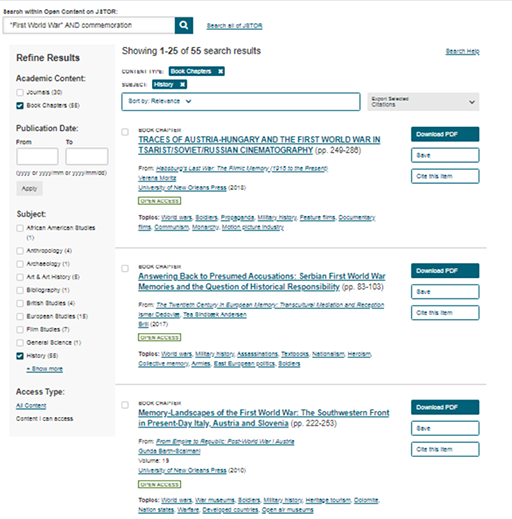5 Using JSTOR
JSTOR is the largest global database of scholarly journal articles, and lately it has also started to include single book chapters. It is highly likely that, for the purposes of A Level coursework, students may want to conduct a search of the database to check if there is any relevant content to the topic that they are pursuing. The database also contains some open access articles that students can view and download for free, although they tend to be quite specialised. Nonetheless, careful searching, using some of the techniques described above, might yield suitable material.
You can go directly to JSTOR’s free content [Tip: hold Ctrl and click a link to open it in a new tab. (Hide tip)] . Starting with a basic search and then adding filters onto the search results may, in this case, be the best method for extracting relevant results. You will have a go at this in the next activity. As a test, I tried: “first world war” AND commemoration. At the time of writing, the results page returned 617 hits, though even a cursory glance at the titles reveals that many are rather niche. The filter options on the left-hand side allow your search to be narrowed. Clicking on ‘history’ (under subject) and ‘book chapters’ (under academic content) reduced the results to 102, as shown in the example below; a more manageable number to assess. You’ll see in my search result, below, some random titles that do not relate to the First World War which I could immediately discard.
More useful still is that the database permits users who have registered for a JSTOR account to view up to six articles or book chapters a month free of charge (if they don’t have access via an institutional account). That scheme covers all of the collection’s content and it is available to everyone – including individual students. One downside for schools and their students is that, unlike the open access collections above, it does not allow for free downloads of material. Still, it should certainly help students to complete their essays and coursework and to become familiar with the types of academic material with which they will be expected to engage if they go on to university.
Activity 2 Conducting a JSTOR search
Register with JSTOR (if you haven’t already), then go straight to JSTOR’s advanced search page and repeat the search exercise on First World War commemoration above. Because this is likely to return a huge number of results, it would be advisable to scroll down and add in filters on subject, document type and language before hitting the search button. Even the first page of results should return half-a-dozen scholarly items that are directly relevant to issues of the First World War’s memorialisation and remembrance.
Then go on to test the capabilities of JSTOR further by looking for historiographical reviews. These types of journal article can be good entry points to a topic, as they summarise recent developments in historical scholarship, methods and interpretation. They are likely to be of more direct use to you than your students, but they can prepare you to help them when they are confronted by a bewildering range of secondary sources.
Try the following search in the database: (("first world war") AND ("historiographical review")). On the results page, you can add filters if you want to.
Comment
In my search, a review article by Heather Jones (2013) is top of the list. It is a good example of a review article. Even a superficial reading should give you a sense of recent scholarship and debates.
Did you know? Open access databases offering academic material
JSTOR contains ample secondary source material, as we’ve seen, but it is limited to scholarly journals and a few book chapters. To widen the search still further, there are several open access databases that offer academic material that might be suitable for students’ use in their coursework.
It is likely that each of these will only offer up a small number of appropriate results, but, since they can be relied upon for accessibility and permanence of access, it could be worthwhile directing your students towards them. The same principles of searching apply as you would use with the other resources we’ve discussed. The ones most likely to yield results on First World War topics are as follows:
- The Directory of Open Access Books (DOAB) contains a small collection of full volumes from academic publishers in PDF format.
- The Directory of Open Access Journals is a community-curated online directory that indexes and provides access to high quality, open access, peer-reviewed journals.
- Open Research Library has some overlaps in content with the DOAB but holds a fair amount of material about the First World War. It is better to search the database than to browse it.
- Google Books contains much secondary literature, and though full text versions of recently published volumes are rare, one can often pick up a single chapter or enough text to use in an assignment.
- Project Gutenberg is one of the more famous open resources on the internet, collecting out-of-copyright books and making them publicly available. It is unlikely that you will find any books here published much after the mid-twentieth century, but since most exam boards happily permit students to use older secondary material in their NEA work, this could nonetheless be a useful point of call.
- Similar to Project Gutenberg is the Internet Archive, a searchable meta-database of books and other free scholarly material. There’s not much from the last forty years, but some secondary (and primary) material from earlier that would be particularly suitable to a historiographical project.
In the next section you’ll consider how to make a sensible selection if your search reveals many hits by considering how to evaluate the literature that your search has found.


